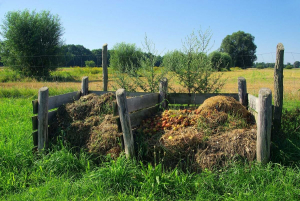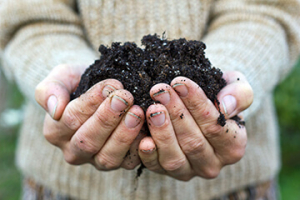 Pop quiz, what is one of the easiest ways to reduce waste on your farm? Start composting! Creating your own compost pile can be easy, cost-effective and helps keep food and other waste out of the landfill. Compost is similar to a gift that keeps on giving.
Pop quiz, what is one of the easiest ways to reduce waste on your farm? Start composting! Creating your own compost pile can be easy, cost-effective and helps keep food and other waste out of the landfill. Compost is similar to a gift that keeps on giving.
First, it provides an alternative place for waste, rather than the landfill. Second, it gives you a nutrient-rich soil amendment than can be spread alongside crops. Still not sold on the whole composting idea? Not a problem. Check out these five reasons why farmers should compost with insight from the IWRC’s compost expert, Jenny Trent.
1. Reduce waste
Many of us fall into the trap of throwing things out and forgetting about it. But much of what we throw away goes and sits in a landfill, taking up valuable land. One opportunity farmers have to produce less trash and send less waste to the landfill is to start composting on your farm! From plants to food waste, we know your farm accumulates lots of organic waste which is rich in nutrients. Why not keep your farm on your farm? Composting will drastically reduce what gets taken to the landfill, producing less trash and turning all of that waste into a valuable resource that you can use.
2. It’s easier than you think
A common misconception about composting is that it’s challenging, it requires expensive equipment or it just won’t work on everyone’s farm. This is not always the case though, especially if you start small and grow all materials are available. According to Trent, one of the main things to remember is that it requires three parts carbon (things like hay or dry yard waste) and one part nitrogen (things like fresh cut greens, manure from herbivore and vegetarian farm animals, and excess food waste or even animal food waste, as long as it’s free of meats and dairy). You alreay have most, if not all of these components around your farm! And once your compost pile is started, you'll just need occasional watering and turning of your pile to create perfect nutrient matter. We've put together a Methods of Composting fact sheet that can help you decide which option will work best on your farm!
3. Save on fertilizers
If you could grow money on trees would you? We would too! That’s exactly what composting does. It’s taking organic waste that you already have and turning it into fertilizers, which you need. Composting is finding a valuable use for something you were sending to the landfill; that makes cents! It can save farmers from purchasing expensive chemical fertilizers and disrupting the soil’s organic makeup. Purchase or create? The choice is up to you.
 4. Improve the structure of your soil
4. Improve the structure of your soil
Clumpy, dry growing soil is as useless for growing as eating soup with a fork but compost can help you restore the valuable structure to your growing soil. It enhances your soil’s structure which supports plant 's roots and prevents erosion. Creating this strong soil composition will allow for better drainage and water retention during our classic midwest summer storms.
5. Enhance soil quality and nutrients
As you know, healthy soil produces healthy plants. Trent explains that “fertilizers feed the plants but compost feeds the soil" which is important if you want long-lasting nutrients. Compost contains countless beneficial microorganisms that help restore soil nutrients and encourage growing.
Composting is a great environmental and economical alternative to sending food and other farm waste to the landfill. Choosing the best method and expanding your knowledge can enhance your compost's efficiency. To help you get started, the Iowa Waste Reduction Center is offering an one-day event, Food Waste Compost Training: On the Farm and In your Community on August 20 in Cedar Falls, IA. Leading the event will be Robert Rynk, a composting expert with more than 25 years of experience.

